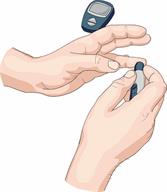Preventing Hypoglycemia
Hypoglycemia is when the amount of sugar, or glucose, in your blood is too low. Low blood sugar can happen if you have diabetes or if you don't have diabetes. It may be an emergency.
Work with your health care provider to make and change your meal plan as needed. This can help prevent low blood sugar.
What can increase my risk?
You may be more likely to get low blood sugar if:
How can low blood sugar affect me?
Mild symptoms
Mild cases may not cause symptoms. If you do have symptoms, they may include:
Hunger or feeling like you may vomit.
Sweating and feeling cold to the touch.
Feeling dizzy or light-headed.
Being sleepy or having trouble sleeping.
A fast heart rate.
A headache.
Blurry eyesight.
Mood changes. These include feeling worried, nervous, or easily annoyed.
Tingling or numbness around your mouth, lips, or tongue.
If a mild case of low blood sugar isn't treated, it can become moderate or severe.
Moderate symptoms
If you have a moderate case, you may:
Severe symptoms
Having very low blood sugar is an emergency. It can cause:
Fainting.
Seizures.
A coma.
Death.
What nutrition changes can I make?
-
Work with your provider or an expert in healthy eating called a dietitian to make a meal plan.
-
Eat meals at set times.
-
Have snacks between meals, as told by your provider.
-
Do
not skip or delay meals or snacks.
What other actions can I take to prevent low blood sugar?

- Work closely with your provider to manage your blood sugar. Make sure you know:
What your blood sugar should be.
How and when to check your blood sugar.
The symptoms of low blood sugar.
-
Be sure to eat food when you drink alcohol.
-
When you're sick, check your blood sugar more often. Make a sick day plan in advance with your provider. Follow this plan when you can't eat or drink like normal.
-
Always check your blood sugar before, during, and after exercise.
How is this treated?
Treating low blood sugar
If you have low blood sugar, eat or drink something with sugar in it right away. The food or drink should have 15 grams of a fast-acting carbohydrate (carb). Options include:
4 oz (120 mL) of fruit juice.
4 oz (120 mL) of soda (not diet soda).
A few pieces of hard candy. Check food labels to see how many pieces to eat.
1 Tbsp (15 mL) of sugar or honey.
4 glucose tablets.
1 tube of glucose gel.
Treating low blood sugar if you have diabetes
If you're alert and can swallow safely, follow the 15:15 rule:
Take 15 grams of a fast-acting carb. Talk with your provider about how much carb you should take.
Check your blood sugar 15 minutes after you take the carb.
If your blood sugar is still at or below 70 mg/dL (3.9 mmol/L), take 15 grams of a carb again.
If your blood sugar doesn't go above 70 mg/dL (3.9 mmol/L) after 3 tries, get help right away.
After your blood sugar goes back to normal, eat a meal or a snack within 1 hour.
Treating very low blood sugar
If your blood sugar is less than 54 mg/dL (3 mmol/L), it's an emergency. Get help right away.
If you can't eat or drink, you will need to be given glucagon. A family member or friend should learn how to check your blood sugar and give you glucagon. Ask your provider if you should keep a glucagon kit at home.
You may also need to be treated in a hospital.
-
-
National Institute of Diabetes and Digestive and Kidney Diseases (NIDDK):
niddk.nih.gov
-
Contact a health care provider if:
These symptoms may be an emergency. Call 911 right away.
This information is not intended to replace advice given to you by your health care provider. Make sure you discuss any questions you have with your health care provider.
